ABOUT SHAW /
Shaw Stars, Hong Kong Shaw Stars, Hong Kong
Shaw Stars (1957-1983)
"When we made 'Eternal Love', I had, in Taiwan, people who came to see the picture 100 times. So I gave instructions to the manager, 'Over 100 times! Let him come in and see. Don't take money from him!"
- Sir Run Run Shaw, Signature, March 1990.
The Shaw films provided the vehicle for many performers to become household names throughout the world. In addition, many were honored at film award events such as the Asian Film Festival, Golden Horse Awards, International Independent Producers Association award, The Rediffusion Hong Kong / Sing Tao Jih Pao Lai Sing Cup and the Wah Kiu man Po Golden Globe Awards. Until the advent of work by directors such as Chang Cheh, female stars dominated the scene.
Their popularity was such that actresses had to even play male roles in many films.
A few actresses had the star power to become legends in their own time.
Such was four-time Asian Movie Queen Lin Dai (1953-1967) who won numerous awards including Best Actress for Li Han Hsiang's 'Kingdom and the Beauty'(1958), Doe Chings Les Belles(1960) and Love Without End (1961) in the Asian Film Festivals.
Her critically acclaimed roles also included her lead in 'The Lotus Lamp (1963) and 'Last Woman of Shang'. Her career, which started in 1953, spanned an incredible 50 films ranging from costume epics to comedies to love stories and musicals.
But on 17 July 1964, due to personal distress, Lin Dai committed suicide at home with an overdose of sleeping pills. She died just five months before her 30th birthday. Her tragic death left Chinese communities around the world shocked with grief. In 1966, Lin Dai's unfinished last film, 'The Blue and the Black', was voted Best Picture of the Year at the 13th Asian Film Festival and she was given a posthumous lifetime achievement award.
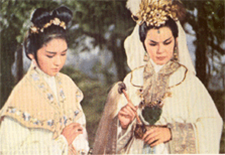
Lin Dai in 'The Lotus Lamp', 1964
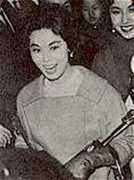
Lin Dai, Asian Film Festival 1962
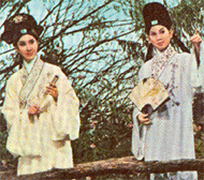
Love Eterne (L) Ivy Ling Po and Betty Loh Tih 1963
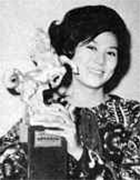
Ivy Ling Po, Golden Horse Awards, 1964
Following on the heels of Lin Dai was the multi-talented actress Ivy-Ling Po.
Joining the studio in 1962, it would be a year before The Love Eterne catapulted her to fame and won her the 'Golden Horse' award for acting in Taiwan.
From there, she became the top box office draw in Southeast Asia as well as the region's most consistant poll-winning star. Her follow up film 'Lady General Hua Mu-lan' (1964) won her the title of Asian Movie Queen at the 11th Asian Film Festival.
The film spread Ivy's fame even to the West after it premiered in San Francisco's Union Theatre and achieved rave reviews in the New York Times. Notable awards in her career include the 'Most Versatile Talent' award in 1965 for her role in 'The Grand Substitution' as well as the 'Best Supporting Actress' award in 1975 for her role in 'Empress Dowager'.
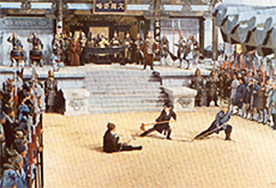
Lady General Hua Mu-lan 1964
Li-Li Hua is another legendary performer from the Shaw stables. First appearing before the cameras at 16, she played in over 100 movies ranging in roles from paupers to queens. Some of these teamed her up with her husband Yen Chun, a leading man and an accomplished director in the studio.
Over her long career, Li-Li Hua won numerous awards for acting including 1963s and 64's Asian Film Festival Best Actress for Empress Wu and 'The Grand Substitution' respectively and the Golden Horse Award for Best Actress for 'Between Tears and Smiles' in 1964.
Billed as the most enduring star of her time, Li-Li Hua's is best remembered for her definitive performances in 'Empress Wu' and 'The Magnificent Concubine' which won her a world wide following.
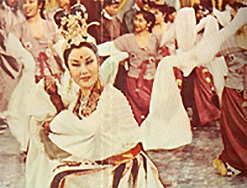
Li Li Hua in 'Yang Kwei Fei', 1961
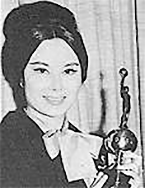
Li Li Hua, Popularity Award 1962
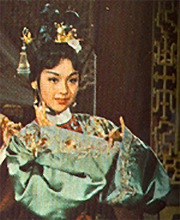
Li Ching in The Mermaid, 1964
A new breed of screen queens took centerstage from the mid 1960s. Li Ching, a native of Shanghai, joined the Shaw ranks in 1963 and started out playing roles opposite the legendary Lin Dai in Griffin Yueh's 'The Lotus Lamp' (1963) and Ivy Ling Po in 'The Crimson Palm'.
Overshadowed by the veterans early in her career, she came into her own when she became the youngest to win Best Actress at the 12th Asian Film Festival for 'The Mermaid' (1964).
In 1966, 'Susanna', the film in which Li Ching had a starring role, won the coveted 'Best Picture' award at the 14th Asian Film Festival.
Throughout her career, her versatility as a top billing actress was demonstrated with starring roles in genres ranging from musical 'Hong Kong Rhapsody' (1968), to horror Mission Impossible (1970), to costume epics like 'The New One Armed Swordsman' (1971) and 'The 14 Amazons' (1973).
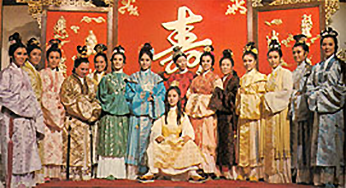
The 14 Amazons, 1973
Another notable actress of her time was Lily Ho. Born in Anhui Province, Lily joined the studios in 1964 after graduating from The Girl's Middle School in Taiwan.
From the start, she showed remarkable promise, working with directors such as Yuen Chiu Feng 'Song Fest', Pan Lei 'Song of Orchid Island' (1965) and Ho Meng Hua 'The Monkey Goes West' (1965).
It was with her leading role in Doe Ching's 'My Dream Boat' (1967) that Lily achieved box office recognition.
In 1967, 1968, 1969 she was named one of the year's top ten stars by the Overseas Chinese Daily of Hong Kong.
A versatile actress, Lily Ho easily crossed genres, starring in costume films like 'The Silver Fox' (1967) and Cheng Kang's The 14 Amazons (1972); contemporary thrillers like
'The Lady Professional (1971); comedies like 'The Warlord' (1972); skinflicks like Intimate Confession of a Chinese Courtesan (1972) and Sex, Love and Hate (1974).
For her role in 'The 14 Amazons', Lily Ho won the 'Extra Characteristic Star' title at the 1973 Asian Film Festival.
Throughout the 1970s, Lily Ho, Li Ching and Ivy Ling Po were known by film fans all over the world as 'Shaw's Super Trio'.
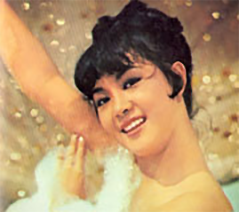
Lily Ho in 'Angel with the Iron Fists', 1966
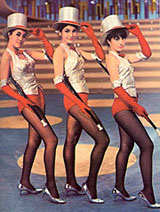
Lily Ho, Cheng Pei Pei and Chin Ping in Hongkong Nocturne, 1966
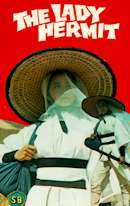
In the realm of action, two female stars - Cheng Pei Pei and Shih Szu were legend.
They slashed their way through films like Lady of Steel (1970), The Shadow Whip (1970) and The Lady Hermit (1971).
Cheng Pei Pei, trained in ballet and contemporary dance, originally entered Shaw employ as a dance choreographer. Her first film was 'The Lotus Lamp' (1963) in which she was the choreographer and also the 'male' lead opposite screen idol Lin Dai.
Her second film, 'Lover's Rocks' won the International Independent Producers' Golden Accolade Award for best new dramatic talent in 1964. The turning point for Cheng Pei Pei was King Hu's 'Come Drink With Me' (1966) which firmly established her as an action star.
In 1971, after filming 'The Lady Hermit', she took a temporary hiatus to get married.
The film went on to become a blockbuster and propelled her sidekick Shih Szu into the limelight.
Shih Szu, a native of Hunan, was raised in Taiwan. Like Cheng Pei Pei, she was trained in ballet and folk dance from a tender age. She joined the studios in 1969 having beat over 3000 entries at a Shaw audition. Her first film was 'Crimson Charm' followed by 'Lady Hermit'. Over the next decade, Shih Szu made a name for herself in many films, among them 'Thunderbolt Fist' (1972), 'The Shadow Boxers' (1974), 'Legend of the Seven Golden Vampires' (1975), 'The Young Avenger' (1976) and Jade Tiger (1977).
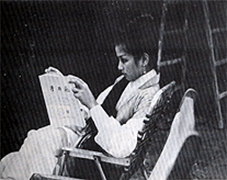
Cheng Pei Pei learning her lines, 1966
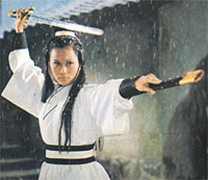
Shih Szu in Thunderbolt Fist 1972
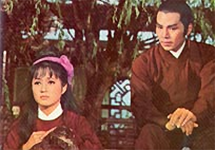
Chin Ping and Chiao Chuang 'Trail of the Broken Blade' 1967
Another popular star of the swordfighting genre was Chin Ping. She joined Shaw in 1962 and trained at the Southern Drama Group.
After graduation, Chin Ping went to Japan's Toho Art Academy to further her study in acting. A lethal combination of beauty and skills, Chin Ping appeared in 'The Crimson Palm', 'Temple of the Red Lotus' (1965), 'The Twin Swords' (1968) and 'The Killer Dart' (1968) among many films.
Although male leads like Peter Chen Ho, Chin Han, Chang Chung and Kwan Shan were popular in the 1960s, they still took second billing to their female counterparts.
It wasn't until the late 1960s, when martial arts movies took hold that male actors came into their own. Throughout the next decade, David Chiang, Ti Lung, Lo Lieh, Wang Yu, Gordon Liu and Fu Sheng were the martial arts A-list who brought the scripts of Chang Cheh and Liu Kar Leung to life.
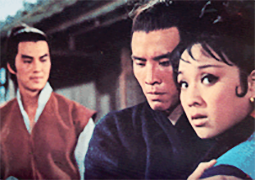
From Left: Ti Lung, David Chang and Li Cheng in 'The New One Armed Swordsman', 1971
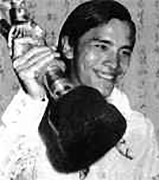
David Chiang, Asian Film Festival 1972
David Chiang, a Shanghainese, was discovered by Chang Cheh in 1968. He started his career as a stunt double for swordsman Ching Miao in the 'Golden Swallow' (1969) before taking the lead in 'Have Sword Will Travel'.
He won Best Actor for his role in 'Vengeance' (1970) at the 16th Asian Film Festival and became Hong Kong's first 'movie king'.
Ti Lung was born in Sinwei, Kwangtung and schooled in Hong Kong.
Upon graduation from Eton English college in Hong Kong, he joined the studios in 1967. Having fought in numerous action films such as 'One Armed Swordsman' (1967), 'Have Sword Will Travel' (1969), 'King Eagle' (1970), 'The Duel' (1970), 'Vengeance' (1970) and 'All Men Are Brothers' (1975), he finally won an award for outstanding actor in the 1973 Asian Film Festival for 'Blood Brothers'.
Lo Lieh, a native of Kwangtung was educated in the Peking Normal School before joining Shaws in 1964.
Upon graduating from the Southern Drama School at the studio, his first role as a leading man was in 'Flying Dagger' in 1968. But it was his starring role in 'Five Fingers of Death' (1973) that earned him international recognition after the film broke box office records in Europe and America. He then starred in various international co-productions such as 'The Supermen Against the Orient' (1974), 'Bamboo House of Dolls' (1974) and 'Blood Money' (1974). Over his entire career, Lo Lieh acted in over 50 martial arts films.
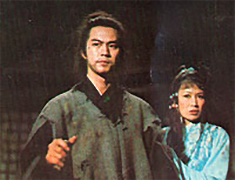
Ti Lung in 'The Magic Blade'
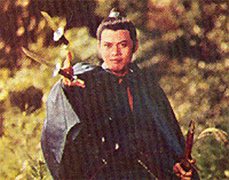
The Flying Dagger 1967 stars Lo Leih
Jimmy Wang Yu, a native of Shanghai, was born in 1943. While studying at the Department of Civil Engineering in Chuhai College, he became the all Hong Kong sprint and swimming champion. At 20, he answered the call of Shaw studio which, at the time was auditioning young men to play the leading role in 'Tiger Boys'(1964). Wang Yu's athletic abilities and muscular physique so impressed Chang Cheh that the young man was given the role. But it wasn't until his next film 'Temple of the Red Lotus' (1965) that he rocketed to stardom. Dedicating his time to further improving his martial arts and swordplay skills, Wang Yu became an international box office superstar with the 'One-armed Swordsman' in 1967.
It broke box-office records everywhere and was the first movie that achieved one million HK dollars.
Over the years, Wang Yu starred in scores of films and became the most bankable star prior to Bruce Lee.
Gordon Liu began his film career in 1977 when his adopted brother, film director Liu Kar Leung, invited him to join the studio. Gordon, a martial artist, brought authenticity to fight scenes in countless classics including 36th Chamber of Shaolin (1978), Shaolin and Wu Tang (1983) and Eight Diagram Pole Fighter (1983).
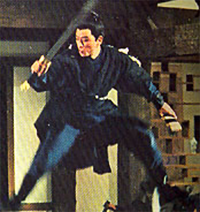
Wang Yu in Sword of Swords, 1968
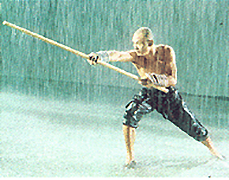
Gordon Liu Chia Hui in 36th Chamber, 1978
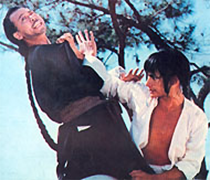
Fu Sheng (right) in 'Heroes Two', 1974
Fu Sheng was born in Hong Kong in 1954. He joined the studio in his late teens and was a graduate from the Southern Drama School. His first film with the studio was 'Heroes Two' in 1974 for Chang Cheh, the director he would work with for almost a decade before his tragic death.
Among the many movies Fu Sheng made, several became true classics - Men From the Monastary (1974), The Shaolin Temple (1974), Five Shoalin Masters (1975), Brave Archer (1977) and Legendary Weapons of Kung Fu (1982).
It was on the film Chinatown Kid (1977) that Fu Sheng rocketed to fame in America where the film was partly shot.
It was also on-set that Fu Sheng met his future wife, Jenny Tseng.
The romance between them were covered extensively by the world's press and became the stuff of legends in Hong Kong. Tragedy struck on July 7, 1983. As Fu Sheng was scheduled to work on 8-Diagram Pole Fighter for Liu Kar Leung, he was killed in a car accident.























